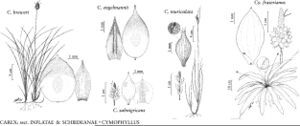Difference between revisions of "Carex breweri"
Ill. Carex, 142, plate 455. 1867.
FNA>Volume Importer |
FNA>Volume Importer |
Revision as of 21:05, 16 December 2019
Rhizomes 2–3 mm thick. Culms 15–22(–30) cm, 2.5–3 mm thick at base. Leaves: sheaths 2–3 cm, fronts often mottled dark brown; blades flattened laterally, with 5–8 conspicuous air cavities, median groove inconspicuous, elliptic in cross section, 10–20(–25) cm × 0.6–1.2 mm. Inflorescences 1.4–2.5 cm × 7–12 mm, staminate portion 2–10 mm. Pistillate scales white medially, 3–5-veined, shorter and narrower than perigynia, leathery, apex acute to acuminate; proximal scales sometimes awned to 4 mm. Anthers 2–3 mm. Perigynia angles veined, shortly 3–10-veined on faces, sessile, broadly elliptic, 5–7 × 3–4.8 mm, base rounded, apex rounded; beak entire; rachilla longer than fruit. Stigmas 1–2 mm. Achenes stalked to 0.15 mm.
Phenology: Fruiting Aug–Sep.
Habitat: Dry rocky or gravel slopes
Elevation: above 2500 m in Calif., above 2000 m in Oreg.
Distribution

Calif., Nev., Oreg., Wash.
Discussion
Carex breweri occurs in the Sierra Nevada and Cascade Mountains north to Mt. Hood.
A. Cronquist (1969) considered Carex breweri and C. engelmannii conspecific; he distinguished them at the varietal level by a difference in pistillate scale characters. The correlated differences in perigynium shape and veins, the dimensions of most structures, and the foliar anatomy support their retention as distinct species.
Selected References
None.
